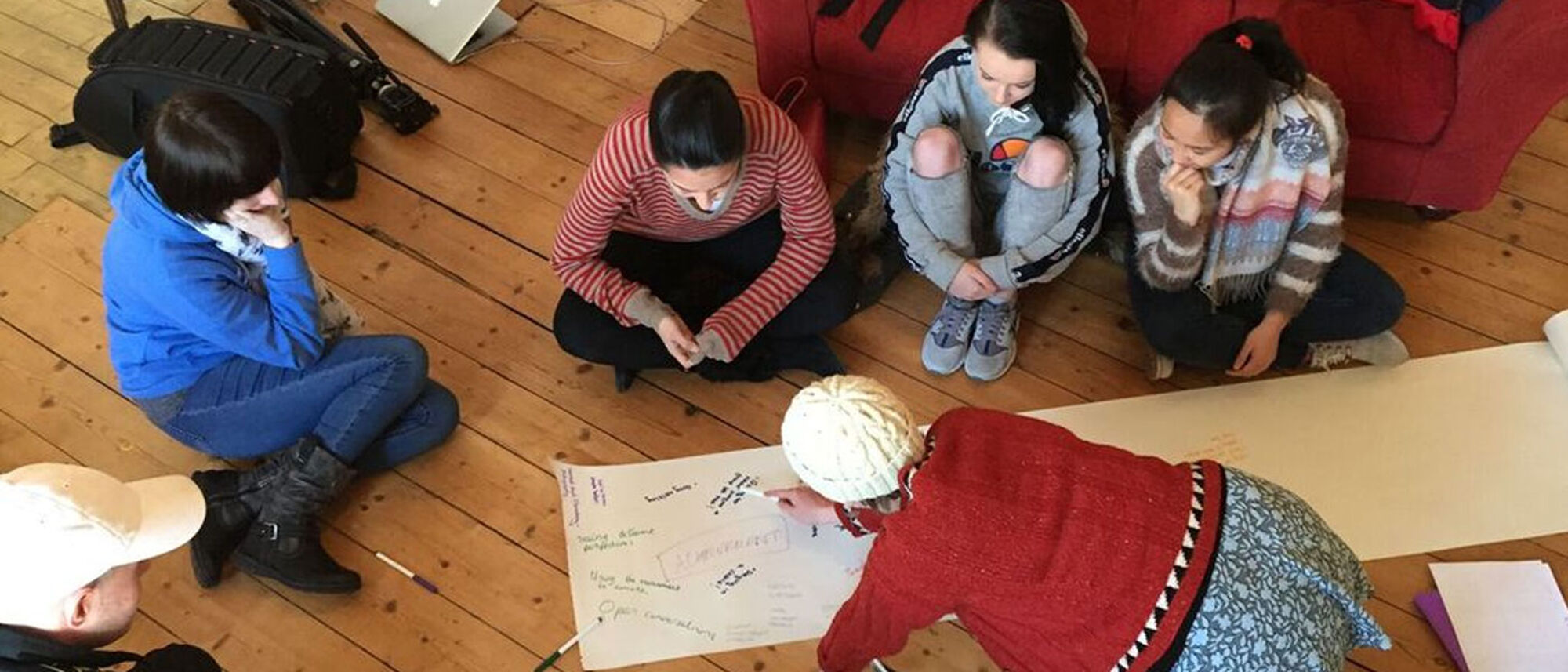Distant voices

'Distant Voices - Coming Home’ explores crime, punishment and reintegration through song-writing and other creative methods, and has been developed in a collaboration between the Scottish Centre for Crime and Justice Research (led by Prof Fergus McNeill) and Vox Liminis (led by Alison Urie), a charity that brings creative practice to criminal justice and its reform.
Musicians work in prisons and communities to support song-writing sessions involving people within or affected by the criminal justice system. In November 2015, the Distant Voices festival at the Centre for Contemporary Arts in Glasgow provided the opportunity to see these songs performed live by some of Scotland’s leading musicians, to hear from some of our best known crime writers, and to view and discuss a documentary about how people move on from crime and punishment. After two successful pilot phases with funding from the University of Glasgow Knowledge Exchange fund, the Economic and Social Research Council (ESRC) Impact Acceleration Account and the Scottish Prison Service, a proposal was submitted to the ESRC in May 2016. That application resulted in a large grant (ES/P002536/1) from the ESRC (and the Arts and Humanities Research Council). The ongoing work is also supported by Creative Scotland and the Scottish Prison Service and the collaboration now extends to colleagues at the Universities of Edinburgh (Oliver Escobar) and the West of Scotland (Jo Collinson Scott).
Already, many songs have been produced and these have been performed and used in many different kinds of public and professional dialogue. The songs have been used as part of academic and professional conferences and in staff workshops. For example, in a recent keynote address at the International Corrections and Prisons Association, the songs helped prison and probation leaders from around the world to explore the experience of being punished and reintegrated and how they might better adapt regimes or practice and better engage with communities to improve post-punishment outcomes.
Feedback from participants suggests that there are quite profound effects for individuals who participate in these song-writing sessions as well as for the institutions that host them. By bringing criminological research about ‘desistance’ (how and why people stop offending) and reintegration into creative dialogue with personal and professional experience, the project aims to get a wide-range of people to think more deeply about reintegration and how it can be supported.
Distant Voices is a successor project to an earlier ESRC funded project called ‘the Desistance Knowledge Exchange’. In that project, Prof McNeill worked with a professional film-maker, academic colleagues, people with convictions, practitioners and policy makers to make a film about why people stop offending and how the criminal justice system could be changed to provide better support. The film was used to support a series of workshops where all of these different stakeholders got together and developed propositions for penal reform. One of the key propositions was that the messages about the challenges of going through punishment, desistance and reintegration needed to be more widely communicated to help challenge the public’s perceptions these processes and the people who go through them.
McNeill explained ‘The song-writing sessions create spaces where people are able to be honest and vulnerable, building confidence, self-esteem, connection and engagement. We conceived this project initially as a knowledge exchange activity but soon realised we were learning more from these creative activities than from more familiar research methods. The new ESRC/AHRC funding is helping us take the work to a different level. Over 3 years (from April 2017), we are trying to understand and practice reintegration and how it can be mediated in this creative way. What we have realised is that as we make and share music together that we become more of a community of people who have come to care about each other’s lives. We want to properly capture this process, reflect on it, write about it and study it’.
Vox Liminis is a charity McNeill helped to establish three years ago as an independent charity is the key partner in this work. Vox’s staff and, in particular, its founder and director, Alison Urie, have extensive experience of community development and creative practice, as well as contacts in the music world. Vox has been able to effectively build complex collaborations with differently situated people and organisations while managing to balance participatory arts and quality in the work produced. The Scottish Prison Service has also been a crucial partner, not just in providing funding and other support, but also in facilitating access. The logistical challenges of taking a music-making scheme into a prison are very complex!
Without Vox Liminis, this project would not have been imagine-able; without the Scottish Prison Service, it would not have been possible. Getting it off the ground required not only people with specific experiences and skill sets but also energy and enthusiasm from all parties to make the project successful. Being willing to reflect and learn together, especially from mistakes, has been vital. McNeill had the following advice for researchers who are thinking of developing a similar project: ‘Pick partners who share your values and whose skills complement your own. Take seriously the implications of working in genuine partnership. Then commit to the project fully… and make sure you have fun!’.
Related links
- Fergus McNeill, Professor of Criminology & Social Work (Sociology)
- World changing research: Addressing Inequalities

